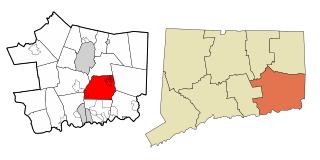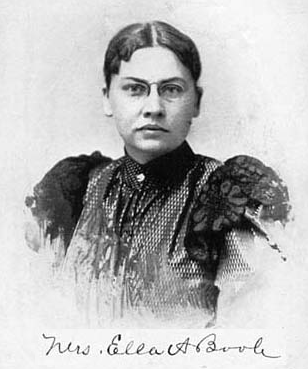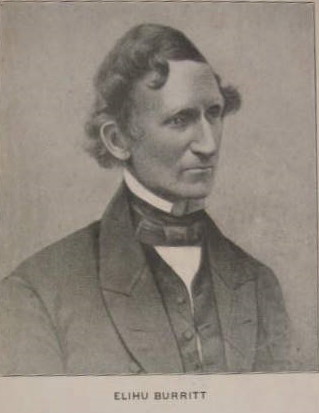
Ida Whipple Benham (January 8, 1849 - May 21, 1903) was a peace advocate.

Ida Whipple Benham (January 8, 1849 - May 21, 1903) was a peace advocate.
Ida Whipple was born in a farmhouse in Ledyard, Connecticut, on January 8, 1849. She was the daughter of Timothy Whipple (1821-1892) and Lucy Ann Geer (1825-1884), and came from a Quaker family. [1]
At an early age Ida Whipple Benham began to write verses. At the age of thirteen years she taught a country school. [1]
She was made familiar with the reforms advocated by the Quakers, such as Temperance movement, anti-slavery, and the abolition of war. She lectured on peace and temperance. She was the director of the American Peace Society, and a member of the executive committee of the Universal Peace Union. She took a conspicuous part in the large peace conventions held annually in Mystic, Connecticut, and she held a monthly peace meeting in her own home in Mystic. [1] She was the vice-president of the Connecticut Peace Society, founded by Jonathan Whipple, Zerah C. Whipple, Enoch Whipple, Timothy Whipple, Jeduthun Whipple, Julia Crouch Culver and Emeline Crouch, daughters of Zachariah Crouch, Jonathan Whipple Jr., and his daughter Content Whipple Waley. [2]
She contributed poems to the New York Independent, the Chicago Advance, The Youth's Companion , St. Nicholas Magazine and other prominent periodicals. [1]
In 1900 one of her poems, "I Wait For Thee," was set to music by C. B. Hawley. [3]
Ida Whipple married on April 14, 1869, Elijah Bailey Benham, of Groton, Connecticut. [1]
From 1886 to 1903 she lived at 7 Elm Street, Mystic, Connecticut. The house was built in 1866 for Rev. William H. Randall. It was a Greek Revival style. Randall was the grandson of Jedediah Randall, a wealthy Mystic merchant, and the son of William Pitt Randall, partner in a whaling firm and founder of the Reliance Machine Co. [4]
She died on May 21, 1903, and is buried at Ledyard Union Cemetery, Ledyard, Connecticut. [3]

Ledyard is a Town in New London County, Connecticut, United States, located along the Thames River. The town is named after Colonel William Ledyard, a Revolutionary War officer who was killed at the Battle of Groton Heights. The population was 15,413 at the 2020 census. The Foxwoods Resort Casino, owned and operated by the Mashantucket Pequot Tribe, is located in the northeastern section of Ledyard, on the reservation owned by the tribe.

Ella Alexander Boole was an American temperance leader and social reformer. She served as president of the World's Woman's Christian Temperance Union (WCTU) from 1931 to 1947, after serving as president of the United States' national WCTU.

Groton is a town in New London County, Connecticut located on the Thames River. It is the home of General Dynamics Electric Boat, which is the major contractor for submarine work for the United States Navy. The Naval Submarine Base New London is located in Groton, and the pharmaceutical company Pfizer is also a major employer. Avery Point in Groton is home to a regional campus of the University of Connecticut. The population was 38,411 at the 2020 census.

The Battle of Groton Heights was a battle of the American Revolutionary War fought on September 6, 1781 between a small Connecticut militia force led by Lieutenant Colonel William Ledyard and the more numerous British forces led by Brigadier General Benedict Arnold and Lieutenant Colonel Edmund Eyre.

Hannah Tatum Whitall Smith was a lay speaker and author in the Holiness movement in the United States and the Higher Life movement in the United Kingdom of Great Britain and Ireland. She was also active in the Women's suffrage movement and the Temperance movement.

Elihu Burritt was an American diplomat, philanthropist and social activist. He was also a prolific lecturer, journalist and writer who traveled widely in the United States and Europe.

William Ledyard Stark was an American Populist Party politician.

George Nixon Briggs was an American lawyer and politician from Massachusetts. A Whig, Briggs served for twelve years in the United States House of Representatives, and served seven one-year terms as the 19th Governor of Massachusetts, from 1844 to 1851.

Originating in New England, one particular Beecher family in the 19th century was a political family notable for issues of religion, civil rights, and social reform. Notable members of the family include clergy (Congregationalists), educators, authors and artists. Many of the family were Yale-educated and advocated for abolitionism, temperance, and women's rights. Some of the family provided material or ideological support to the Union in the American Civil War. The family is of English descent.

Charles Gilpin was a Quaker, orator, politician, publisher and railway director. Amongst his many causes were the movement to repeal the Corn Laws, to establish world peace through the Peace Society, abolition of the death penalty and the anti-slavery movement, enfranchisement by providing freehold land for purchase, liberation of Hungary from the Austro-Hungarian Empire, Hungarian exiles in England, the Poor Law and prison reform, Foreign relations. .. "a thorough liberal"

Sara Louisa Oberholtzer was an American poet, activist, and economist. Interested in the uplifting of humanity, she gave close attention to the introduction of school savings-banks into the public schools since 1889. She made an address on the subject in the first meeting of the Women's Council, in Washington, D.C. in February, 1891, which was printed in their "Transactions." Her address on school savings banks before the American Academy of Political and Social Science, in Philadelphia, in May, 1892, was printed in pamphlet form by the Academy. Her "How to Institute School Savings Banks," "A Plea for Economic Teaching " and other leaflet literature on the subject had broad circulation. She was widely instrumental in establishing school savings banks in the United States, Canada, Australia and the Sandwich Islands. She was also elected world's and national superintendent of that work for the Woman's Christian Temperance Union, which enlarged its channels. As W. C. T. U. World's Superintendent of School Savings Banks, Oberholtzer hoped to introduce this system in other countries beyond the U.S.

Phebe Ann Coffin Hanaford was a Christian Universalist minister and biographer who was active in championing universal suffrage and women's rights. She was the first woman ordained as a Universalist minister in New England and the first woman to serve as chaplain to the Connecticut state legislature.

Brigadier General James Appleton was an American abolitionist, early supporter of temperance, and politician from Maine.

Mary Mendenhall Hobbs, was an American Quaker advocate for women's education, temperance, and suffrage, based in North Carolina. Her campaigning to improve women's education supported the founding of the University of North Carolina at Greensboro in 1891.

Elizabeth Leslie Comstock was a Quaker minister and social reformer, abolitionist and worker for social welfare who helped the Society of Friends adjust to the urban-industrial age. Comstock was a very active spokesperson who educated people about those stricken by illness in places such as hospitals and prison camps. In the time of the American Civil War, Comstock worked to relieve people who had recently been freed. Comstock was instrumental in the Underground Railroad, leading a very active station in Rollin, Michigan.
The Universal Peace Union was a pacifist organization founded by former members of the American Peace Society in Providence, Rhode Island with the adoption of its constitution on 16 May 1866; it was chartered in Philadelphia, Pennsylvania, on 9 April 1888. It ceased operations in 1913, shortly after the death of Alfred H. Love, who served as the organization's president from its founding. Other founders and officers included minister and reformer Adin Ballou, American Red Cross founder Clara Barton, politician and author Belva Ann Lockwood, reformer Lucretia Mott, Nobel Peace Prize winner Frédéric Passy, editor Mary L. F. Ormsby, and politician and educator John Wesley Hoyt. Ella B. Ensor Wilson served as president of the Wilsonton (Kansas) branch of the UPU.

Ida May Hinman (1854–1926) was an American feminist, journalist, suffragette, and temperance activist. She was the author of The Washington Sketch Book, one of the few Washington, D.C. guidebooks written by a woman at the end of the 19th century.

Zerah C. Whipple was a Rogerene American Christian pacifist, war tax resister, and developer of educational methods for the deaf.

Ida Horton East was an American philanthropist and social reformer. She was active in the Daughters of the American Revolution (D.A.R.) and the Woman's Christian Temperance Union (W.C.T.U.).

Alice Brown Caine was an English temperance leader. She served as president of the Women's Total Abstinence Union, the Liverpool Ladies' Temperance Association, and the Deaconesses' National Total Abstinence League.